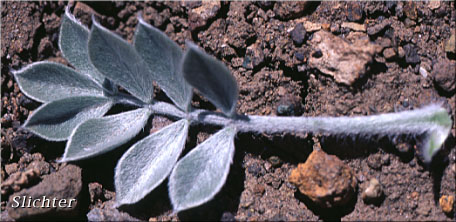Xerophytes

Hedgehog Cactus of the central Oregon high "desert".
Note the many light-colored spines which help reflect light, and the round shape
which helps store water and also helps retard water loss (thick objects don't
heat as quickly or lose as much water!). The lower photo also demonstrates the
light reflective property of many light-colored spines.
Xerophytes (dry + plant) are plants which are
able to live in very dry places. When water is abundant, their rate of transpiration
is about the same as other plants. However in prolonged drought, they have several
survival mechanisms which make them successful.
 Xerophyte
survival characteristics:
Xerophyte
survival characteristics:
1. Thick cuticle.
2. Stomatal closure.
3. Reduction in # of stomata.
4. Stomata hidden in crypts or depressions in leaf surface (less exposure
to wind and sun).
5. Reduction in size of transpiration surface (lower leaf only).
6. Increased water storage.
7. Thicker leaves and stems, or leaves reduced in #, or leaves drop off during
dry season.
8. Leaves covered with silvery hairs (creates wind break & light reflective
surface).
9. Deep taproots or widespreading fibrous roots near the soil surface.
10. Low growth form (reduces H2O loss from wind).
11. Reduced life cycles.

Leaf of a milkvetch iillustrating the leaf surfaces covered
with many silvery hairs to reduce surface temperature and reduce water loss.
Long & Slichter


 Xerophyte
survival characteristics:
Xerophyte
survival characteristics: